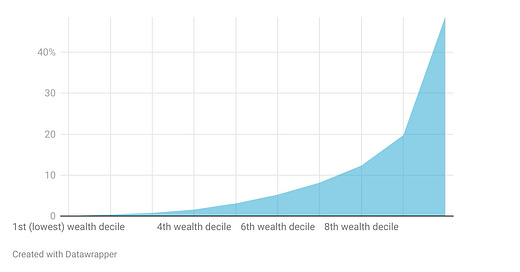Some of us grow up with the saying that if we work hard we will be able to be rich and get up the ladder. This may have been the situation in the past especially and some of our parents managed to get up the ladder, but what is the situation in our modern economy?
Unfortunately, working hard doesn’t necessarily make you rich these days. Analysis from the Institute of Fiscal Studies (IFS) found that the wealth of your family and where you are born in the UK determines your opportunities for social mobility.
Wealth is one of the main determinants of our success, but it is not evenly distributed within the UK. The wealthiest 10% of individuals hold almost half of all wealth, which has a consequence to increase the divide between the rich and the poorests. Because of the rapid rise in asset prices and the stagnation of incomes, wealth has been growing faster than income which has been making it harder for working class individuals to climb the wealth distribution.
One of the main determinants of wealth is house ownership, with property wealth being the largest source of wealth for the richest households. The increase in house prices relative to income has increased the wealth of homeowners and helped them climb the social mobility ladder, however it is a major obstacle for the younger generations to improve their chances on social mobility.
The chart below compares individuals born in different decades and average homeownership by age. It shows the consequence of increasing housing prices for the youngest generation, for example those born in the 1970s were less likely to own homes than those born in the 1950s and 1960s were at the same age, and those born in the 1980s were even less likely. According to the research from IFS “only 36% of those born in the 1980s were homeowners by age 30, compared to 55% of those born in the 1970s and over 60% of those born in the 1950s and 1960s. A natural consequence is that wealth is becoming increasingly concentrated amongst older people, whilst half of working-age adults are now renting.”
But our chances to have a better life do not depend only on our ability to own our own house, they depend on the wealth our parents have as well. Having wealthy parents is increasing your probability of being wealthy as well. As shown in the chart below produced from IFS “children of the wealthiest fifth of parents are eight times more likely to be in the wealthiest fifth themselves than are the children of the poorest fifth, but the children of the poorest fifth are less than three times more likely to be in the poorest fifth themselves than are the children of the wealthiest fifth.”
Having a rich parent doesn't only mean that you will inherit their wealth, higher levels of family wealth have been associated with children having higher levels of education or earnings, both essential tools to improve your opportunities in life. Also they appear to learn more about managing their finances, as children from rich families are more likely to save their money or to hold a larger share of their wealth as higher-return investments such as stocks and shares. But most importantly children from wealthy families are significantly more likely to be homeowners by age 30 and this is related to their higher earnings.
We have seen that wealth plays a significant role in social mobility. But wealth is not evenly distributed in the country, and the gap of wealth among generations has been increasing the regional disparities. For example, children of Londoners that were born in the 1980s have parents with more than twice as much wealth, on average, as the children of people living in the North East and 66% more wealth than the English average. This can be explained by the rapid increase in house prices, but as a consequence driving an increase in the divide between North and South of England, creating long term inequalities of opportunity and even more challenges for levelling up the whole country.
In this modern age wealth is one of the most important determinants of social mobility as it affects our future earnings, education and economic well-being. The unequal distribution of wealth is increasing already existing inequalities between rich and poor or between regions within the UK, an issue that needs a coordinated long term policy action to be dealt with.





